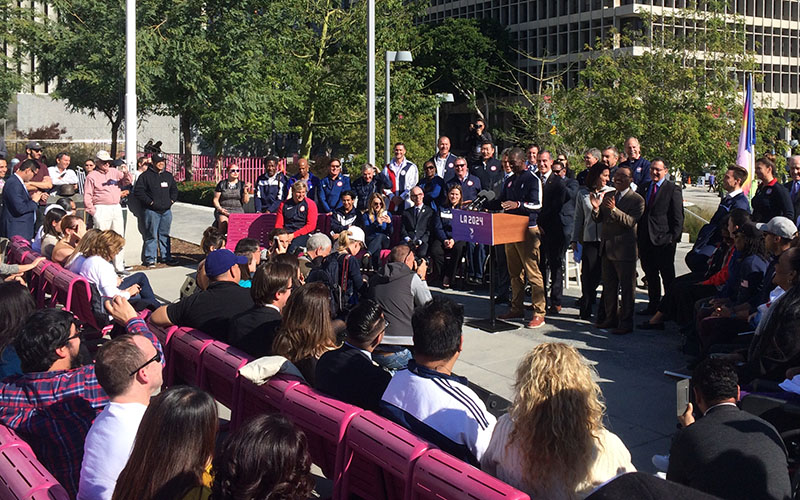Los Angeles – In a room full of current and former Olympians and Paralympians, the Los Angeles City Council approved a privately run bid to host the 2024 Olympic Games. Thursday’s agreement was the 14th unanimous vote in relation to the bid and the last local step in the final stage of the bid process.
For Angelinos, this means their city has agreed to cover over-budget costs if the Games come to Los Angeles. LA 2024, the private committee behind Los Angeles’ bid, has already set aside $491.9 million in contingency funds and taken out multiple insurance policies as a first line of defense against an over-budget Olympics. If those funds are insufficient, the city has pledged responsibility for the next $250 million and the state has pledged to pay $250 million after that.
This contract between LA 2024 and the city will be submitted to the International Olympic Committee immediately. On September 17th, the IOC will decide if the Games will take place near the beaches of the west coast, at the foot of the Eiffel Tower in Paris, or next to the Chain Bridge of the distant outsider, Budapest, Hungary.
Bid leaders estimate the total cost of Los Angeles’ third Olympic Games to be $5.3 billion. This heavy figure will be covered by revenue from broadcast rights, domestic sponsorships and ticket sales, according to LA 2024.
The Olympics, historically, have not been a financially beneficial event to host cities. “Going for the Gold: The Economics of the Olympics,” a journal article written by economic professors Robert A. Baade (Lake Forest College) and Victor A. Matheson (College of the Holy Cross), lists the hefty prices of recent Olympics.
Sydney 2000 is the closest to LA’s budget with a total cost of $6.926 billion. Athens 2004 cost an estimated $13.8 billion and Rio de Janeiro 2016’s price tag was over $10 billion.
Beijing 2008 was one of the most costly summer Olympics ever, with an estimated final tally of $45 billion.
Casey Wasserman, chairman of LA 2024, believes his team’s “no surprises” budget will show that “bids can deliver benefits, not burdens, to host cities of the future.”
Eighty-five percent of proposed venues are in place or planned, and the villages for media and athletes will be at USC and UCLA. Also, according to LA 2024, by using existing facilities and privately funded projects that would be finished well before the Games, they can mitigate the costs of hosting.
At the time of the budget’s public release, LA 2024 also posted an independent analysis from accounting firm KPMG. The analysis was requested by the city and paid for by LA2024.
“Our bid and our budget have been tested and validated more than any bid in Olympic history and we do not rely on public investments. Using existing world-class venues, we can focus on the delivery and the experience for athletes, not on building facilities,” Wasserman said.
Los Angeles’ 1984 Olympics, an event where LA was the only bidder, relied on the same logic. It used the Los Angeles Coliseum for track and field, opening and closing ceremonies and received heavy corporate sponsorship to alleviate the financial burden. As Baade and Matheson noted, it remains one of the few Olympics in modern history to turn a profit. That money was used to fund youth sports programs, a detail that many Olympians referenced in their addresses to the city council.
One of those programs was in support of the Southern California Tennis Association. Its post-Olympic expansion helped start the careers of Venus and Serena Williams, natives of Compton. The sisters will face off in the Australian Open final on Saturday in Melbourne.
The 1984 Games themselves profoundly affected swimming icon Janet Evans and she credited them for pushing her towards golden heights.
“I can still recall being 12 years old and watching the LA Games here in my hometown. Those Games inspired me to chase my own Olympic dreams, as they did for countless American and international athletes,” she said.
Mayor Eric Garcetti is confident that an Olympics in 2024 can bring forth the same messages of global positivity and inclusivity.
“In 2024, we want to be a Games-changer again. We want the world to see the very best in us here in Los Angeles, the best in this country, and to show a country engaged and of and in the world.”
